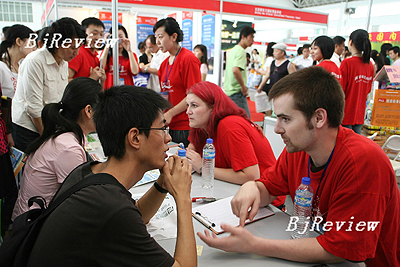
One Family, 1.8 Children
Less than 40 percent of the population is restricted by the family planning policy to having one child, and China does not want the current birth rate of 1.8 per couple to fall, a senior official with the National Population and Family Planning Commission said July 10.
While popularly known as the "one child policy," the rule actually restricts just 35.9 percent of the population to having one child, Yu Xuejun, a spokesman with the commission, said in a webcast on the government's website (www.gov.cn).
Apart from Henan Province, couples can have two children if they are both "only children," he said. In addition, more than 11 percent of the population, mostly minority groups, is free to have two or more children, he said.
In many rural areas, couples are allowed to have a second child if their first is a girl. This applies to 52.9 percent of the population.
Chinese Murdered in Pakistan
The government, on July 9, condemned the killing of three Chinese workers in Peshawar, capital of Pakistan's North West Frontier Province, and urged Pakistan to uncover the reasons for the attack as soon as possible and mete out severe punishments to those responsible.
Condemning the attack by unidentified gunmen at a workshop with four Chinese workers, Foreign Ministry Spokesman Qin Gang said in a statement that the Chinese Government was very concerned about the attack, and had lodged urgent representations with the Pakistani Embassy in Beijing and the Pakistani Government.
Qin said in the statement that China has asked Pakistan to provide medical treatment to the wounded man and help repatriate the bodies of the dead, as well as take effective measures to ensure the safety and security of all Chinese in Pakistan.
Corrupt Official Executed
Zheng Xiaoyu, former head of China's State Food and Drug Administration, was executed on July 10, becoming the country's fourth senior official of this rank to be sentenced to death since 2000.
Zheng, 63, was sentenced to death on May 29 by the Beijing Municipal No. 1 Intermediate People's Court after being found guilty of taking 6.49 million yuan in bribes and dereliction of duty.
Zheng appealed for leniency in a second hearing on June 12, arguing the penalty was "too severe" and asking the court to reconsider the sentence. He also gave evidence that implicated other officials in the case. The Higher People's Court of Beijing rejected Zheng's appeal on June 22 and upheld the death sentence.
Fake Medical Advertising Crackdown
China's health officials had investigated 1,200 cases of illegal medical advertising and penalized the institutions responsible by the end of April, according to the Ministry of Health.
The government had issued amended regulations on medical advertising in November, in an attempt to prevent false and misleading advertising.
The regulations, effective since January 1, ban the depiction of medical techniques, treatment methods, patients or experts, the army and armed police and claims of certain cures. In March alone, 36 websites promoting bogus military medical institutions were closed down, according to the ministry.
Substandard Exporters Blacklisted
China's quality supervision authorities have blacklisted 14 companies for planning to export substandard food products and banned them from further exports.
The companies were exposed by the General Administration of Quality Supervision, Inspection and Quarantine on its official website, www.aqsiq.gov.
"They will be banned from exporting food products," Lin Wei, an official with the administration, said on July 10 in Beijing.
The substandard products, which included preserved seafood and fruit, were destined to be exported to Japan, Canada, the United States and the European Union, according to the administration.
Some of the products were found to contain additives such as sulphur dioxide in excess of levels set by the importing countries, or were found to be contaminated by harmful bacteria.
| 